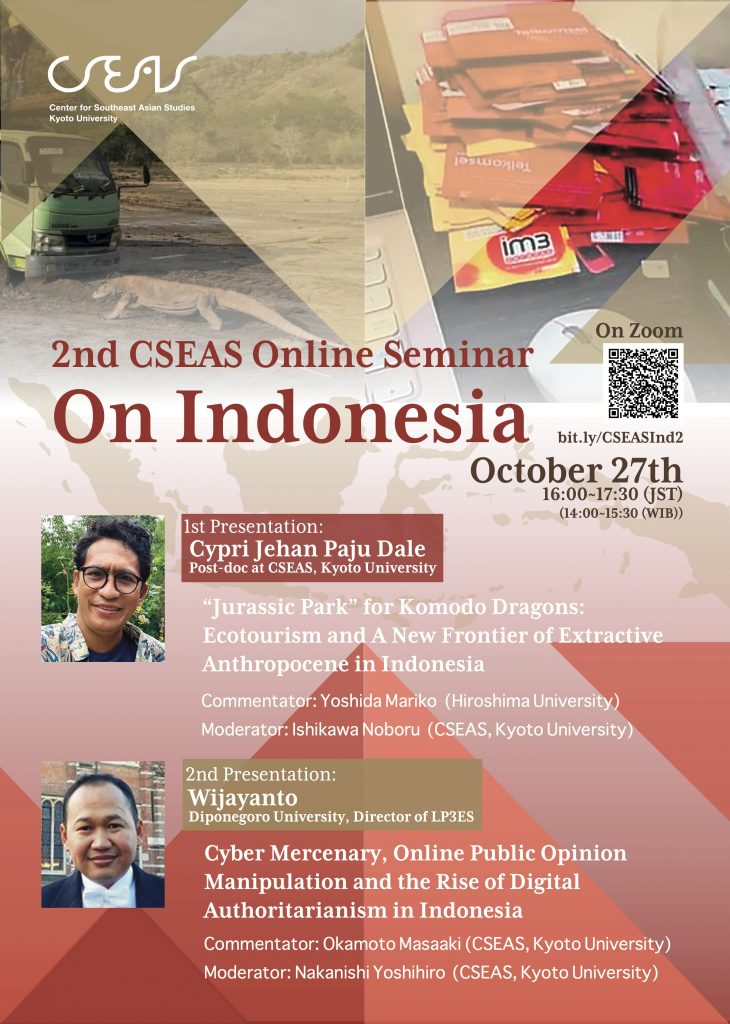You are cordially invited to our online seminar on Indonesia. The topics are Cyber Mercenary and “Jurassic Park” Project in Komodo.
Date and Time: October 27, 2021, 16:00 – 17:30 (JST/GMT+9)
Registration from the URL below: (QR Code)
https://bit.ly/CSEASInd2
1st Presentation: “Jurassic Park” for Komodo Dragons: Ecotourism and A New Frontier of Extractive Anthropocene in Indonesia
Speaker: Cypri Jehan Paju Dale (Post-doc at CSEAS, Kyoto University)
Commentator: Yoshida Mariko (Hiroshima University)
Moderator: Ishikawa Noboru (CSEAS, Kyoto University)
2nd Presentation: Cyber mercenary, online public opinion manipulation and the rise of digital authoritarianism in Indonesia
Speaker: Wijayanto (Diponegoro University, Director of LP3ES)
Commentator: Okamoto Masaaki (CSEAS, Kyoto University)
Moderator: Nakanishi Yoshihiro (CSEAS, Kyoto University)
Abstract of 1st Presentation:
It is commonly claimed that eco-tourism is a mode of development that can champion both economic growth and conservation agenda as it generates revenue to finance the protection of bio-diversity reserves, contributes to the sustainable livelihoods of local communities, and opens new opportunities for investment (UN Declaration 2002, Das and Chatterjee 2015, Wearing and Neil 2009, Bradon 1996, Spergel 2001). With that assumption in mind, the government of Indonesia is currently transforming Komodo National Park—the natural habitat of the iconic and pre-historic reptile known as Komodo dragons, and their companions—into a so called “National Strategic Zone for Tourism”. A “Jurassic tourism” facility has been constructed in the park, along with the granting of various business concessions to private and state-own companies. Based on ethnographic research on current development and communities’ resistance against that development in the area, this presentation interrogates how and why current development not only fails to fulfill its promises, but also lead to a new frontier of extractive Anthropocene.
Abstract of 2nd Presentation:
Various studies on the current stage of democracy in Indonesia has shown that this third largest democracy in the world is in a serious democratic decline. Some scholars have even argued that Indonesia is on the verge of authoritarianism, partly indicated from its success in carrying out repression in the digital public sphere. However, the study of how online public opinion manipulation by cyber mercenaries has impacted democracy in this country has never been conducted. This presentation will analyze the use of cyber mercenaries to manufacture public consent through online public opinion manipulation, to support four problematic policies in Indonesia: the revision of the law on the national anti-corruption body in 2019, the implementation of the New Normal policy, the creation of the omnibus law and the direct election of the regional head in 2020. This study employs a mixed method consisting of social media analysis, digital ethnography and classical ethnography carried out from the end of 2019 to 2021. In this seminar, the author will present some of the preliminary findings of this research such as: the actors behind the online propaganda, their motivations, the language they use, as well as their organizational structure and funding. He will also shed light on the pattern of public opinion manipulation to support those four aforementioned policies.
Bio of the 1st Presenter:
Cypri Jehan Paju Dale (cdale[at]cseas.kyoto-u.ac.jp) is currently a post-doctoral researcher at Center for Southeast Asian Studies (CSEAS), Kyoto University, Japan. He earned his Ph.D. at the Institute of Social Anthropology at Bern University in Switzerland in 2018 with a dissertation entitled “Development as Self-Determination: Anti-colonial Struggles, Endogenous Transformation, and the Role of Christianity in West Papua.” At CSEAS, he is working on a book manuscript from his dissertation while embarking on a new research project that examines social, cultural, and ecological transformations brought by the introduction of large-scale tourism development and conservation projects in the Islands of Flores, Indonesia. At the core of this research is an investigation of the entanglement between conservation, eco-tourism, and interspecies companionship in the Komodo National Park, a 1773 km2 terrestrial and marine protected zone that is the home of Komodo dragons (Varanus komodoensis) and their companions, including humans.
Bio of the 2nd Presenter:
Wijayanto (wijabaru[at]gmail.com) is a senior lecturer as well as the director of an international program at the Department of Politics and Government, Diponegoro University in Semarang, Central Java. He is also the director of the Center for Media and Democracy at the Institute of Research, Education and Information of Economy and Social (LP3ES). For the last fifteen years he has been working on issues related to journalism, media freedom corruption, elections, social movements and democracy in Indonesia. After completing his doctoral degree at Leiden University in 2019 on the biography of Kompas – the oldest, largest and most influential daily newspaper in the country, he has developed a research interest in digital politics and its influence on Indonesian democracy. His current project is on cyber troops and their role in public opinion manipulation in Indonesia funded by The Royal Netherlands Academy of Arts and Sciences (KNAW), the Netherlands, in which he acted as one of the project leaders (2020-current).
Contact: Okamoto Masaaki (okamoto[at]cseas.kyoto-u.ac.jp)(CSEAS, Kyoto Univeristy, Japan)
The monthly online seminar on Indonesia is scheduled as follows:
- November 24, 2021:
Ehito Kimura (Hawaii University) on Transitional Justice
Michel Bueherl (SOAS) on Sulawesi Politics - December 22, 2021: Yamada Chika (CSEAS, Kyoto University) on Drug Issues
